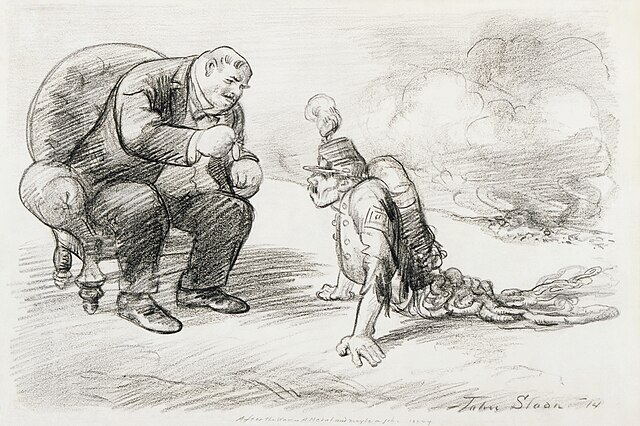Welcome to the Moment of Truth: the thirst that is the drink.
Last week I talked about the artifacts by which we remember both the Shoah and the Captivity of black people in the west. This week I'm going to talk about their comparative aesthetics. The Shoah is mainly urban, industrial, scientific, Norse, Protestant, art deco, sado-masochistic/black leather, red, black and white. The slavery chapter of the Captivity is mainly represented in earth-tones, with hints of blue, and the dripping green of kudzu, rural, agrarian, folk, Southern Baptist, sun- dappled, outsider and itinerant artsy, colonial, linen, and bondage sadist.
The biblical character Moses figures in the liberation theology of both, though ironically more so in the Captivity than in the Shoah. The Shoah's iconography of liberation tends more toward the Maccabean than the Mosaic. Although there are both armies and solitary figures of liberation associated with both mass atrocities, in the Shoah the main figures of resistance, the partisans and the Allies, are armies, akin to the Maccabees if anything biblical, and the downfall of the bureaucratic/industrial enemy is a military one; while Harriet Tubman, guiding her people to freedom through the Underground Railroad as the Moses figure of the Captivity, looms large; liberation depends on the courage and perseverance of individual heroes in the face of interpersonal if pandemic human hatred, hatred that was enacted anew every time an individual crime against dark-skinned humans was committed.
While the portrait of Nazism is painted against a background of policies and laws under which a dormant, innate anti-Semitism was enabled to emerge, giving a great multitude of Europeans permission to commit the crimes they'd always wanted to commit, the institution of slavery was considered the economic end, the means to which was the manipulation of hatred that turned people against their better natures, although this diagram of hatred has since transformed to one more closely resembling the Nazi license model as the Captivity has moved from its slavery phase into its Black Codes, Jim Crow and current carceral/more obviously genocidal phases. Does society make us racists? Or does it merely allow us to act out our inborn hatred of the Other? The answer isn't limited to those choices, especially now that we no longer diagram human nature as reducible to a solid or binary thing but as a spectrum, and a fluid one... read more
Listen live from 9AM - 1:00PM Central on WNUR 89.3FM / stream at www.thisishell.com / subscribe to the podcast
9:20 - Neuroscientist Sarah-Jayne Blakemore explores the new science of the teenage brain.
Sarah-Jayne is author of Inventing Ourselves: The Secret Life of the Teenage Brain from PublicAffairs.
10:00 - Historian Sean Guillory examines the bleak present (and future) of the Russian left.
Sean wrote the article Left in a Corner for Jacobin and makes the very recommended Sean's Russia Blog Podcast.
11:05 - Writer Mark Kurlansky traces the long, complicated, economic and social history of milk.
Mark is author of Milk! A 10,000-Year Food Fracas from Bloomsbury.
12:00 - Environmentalist Helena Norberg-Hodge calls for a movement towards economic localization.
Helena wrote the essay Localisation: A strategic solution to globalised authoritarianism for the Transnational Institute.
12:45 - In a Moment of Truth, Jeff Dorchen shines up some atrocities to see his reflection.
Listen live from 9AM - 1:00PM Central on WNUR 89.3FM / stream at www.thisishell.com / subscribe to the podcast
9:20 - Cultural critic Henry Giroux explores the rise of fascism and the construction of political dystopia.
Henry is author of American Nightmare: Facing the Challenge of Fascism from City Lights.
10:00 - Our Man in San Juan, Dave Buchen reports on the invisible anxiety of life in the colonies.
Dave will also be talking about the return of Hurricane season in Puerto Rico, on the more visible end of the anxiety spectrum.
10:35 - Historian David Broder explains how Italy's hard right emerged from the left's collapse.
David wrote the articles Salvini’s Triumph and Notes on Italy's Election for Jacobin.
11:05 - Writer Elizabeth Rush watches climate change roll across America's new shoreline.
Elizabeth is the author of Rising: Dispatches from the New American Shore from Milkweed Editions.
12:05 - Steven Miller and Nicholas Davis examine the link between White intolerance and anti-democratic values.
Steven and Nicholas are authors of the paper White Outgroup Intolerance and Declining Support for American Democracy.
12:45 - In a Moment of Truth, Jeff Dorchen goes shopping for Holocausts.
Welcome to the Moment of Truth: the thirst that is the drink.
Who among us has not said, "I hate this city" or "I hate this town" when an idiosyncratic characteristic of the place gets on our nerves? When the smell of urine in the subway station in Manhattan offends our nostrils, or the anti-Semitism at a bakery in Paris ruins our mood, or a West Hollywood transsexual prostitute's callous ridicule wilts our ardor?
And who among us has not said, "I hate this country" when a Trump supporter threatens to call ICE on a customer at TGIFriday's for ordering a margarita with excellent pronunciation, or in India when some martinet at the airport delays you in a bureaucratic hazing ritual for overstaying your visa by three hours, or in Australia after tripping over a homeless kangaroo in the gutter?
And who among us, when witnessing the cruelty of nature or humanity, disease or war or volcano or medical malpractice, had not said, "I hate this world" or "life's a bitch?"
Our love is like a ship on the ocean, and we're sailing with a cargo full of love and devotion. But the ocean is an ocean of lies. They call the United States a nation of laws, but it's an ocean of lies. The fish are tainted with it. We've spread it to the rest of the world, to an extent, but nowhere is the falseness more highly concentrated than here.
It begins in our education system, which has little to do with schools and everything to do with media. If education consists of all the information we pass on to each other, then we spend the most money by far educating each other about crap we want to sell each other. Financial services alone spent $17 billion last year educating us about how to make our money magically turn into more money. Think of all the blood and treasure that went into selling burgers and lotions and herbal nonsense and cars with autopilot that crash into the police for you.
"Wake up to what matters: Alicia Silverstone, With a New TV Show, Proves She’s Not Clueless." That was on the front page of the New York Times online last night. News that's fit to print? That's what matters? Alicia Silverstone? This will grow your hair back, make you slender, make all three, count them, three kinds of women pursue you down the beach. Everything is a sales pitch. And we're used to it. We know it's all lies, but we accept that everyone will lie to us. We acknowledge the farce.
The ads are bad enough, and there's the soft, elegant state and... read more
In 1941 – (77 years ago) — four truckloads of Nazi German paratroopers arrived at the village of Kondomari, on the Greek island of Crete, where local farmers, armed with crude weapons and assisted by New Zealand troops, had fiercely resisted the German invaders just days before. The Germans had lost several hundred troops in their World War II invasion all across Crete, and now their survivors on the island were being ordered to carry out reprisals against Greek civilians — and to do it fast, without trials or other formalities. At Kondomari, the Germans surrounded the village and rounded up men, women, and children in the town square. Then a number of Greek men were chosen from the group, while the women and children were let go. The Germans led the men to a nearby olive orchard, where they methodically lined them up and shot them dead. German records list twenty-three victims, but Greek sources put the death toll at or near sixty. The lieutenant who led the massacre at Kondomari was later killed by Allied troops at Normandy. A German military photographer who captured the Kondomari episode on film was later arrested by the Gestapo and jailed for having secretly helped some Cretans to escape. He survived the war, to testify against Hermann Göring at Nuremberg — but his chilling photographs from Kondomari lay forgotten in German archives until their rediscovery in 1980.
Listen live from 9AM - 1:00PM Central on WNUR 89.3FM / stream at www.thisishell.com / subscribe to the podcast
9:20 - Anthropologist Jason Hickel traces a new, 500 year history of global inequality.
Jason is author of The Divide: Global Inequality from Conquest to Free Markets from Norton Books.
10:05 - Live from São Paulo, Brian Mier reports on the strike wave sweeping Brazil.
Brian translated the recent articles Truckers’ strike: not perfect but demands are legitimate and Trucker Strike: Petrobras’ Dismantlement Leads Brazil to Chaos for Brasilwire.
10:35 - Journalist Victoria Law examines the dark business of immigrant detainee labor.
Victoria wrote the feature Investigation: Corporations Are Profiting From Immigrant Detainees’ Labor. Some Say It’s Slavery. for In These Times.
11:05 - Writers Zoé Samudzi and William C. Anderson connect Black resistance to the building of a new world.
Zoé and William are authors of As Black As Resistance: Finding the Conditions for Liberation from AK Press.
12:05 - Anthropologist Kathryn Dudley finds death and dispossession on the American farm.
Kathryn wrote the article Traumas of Dispossesion for Jacobin.
12:45 - In a Moment of Truth, Jeff Dorchen snorkels around in a sea of lies.







